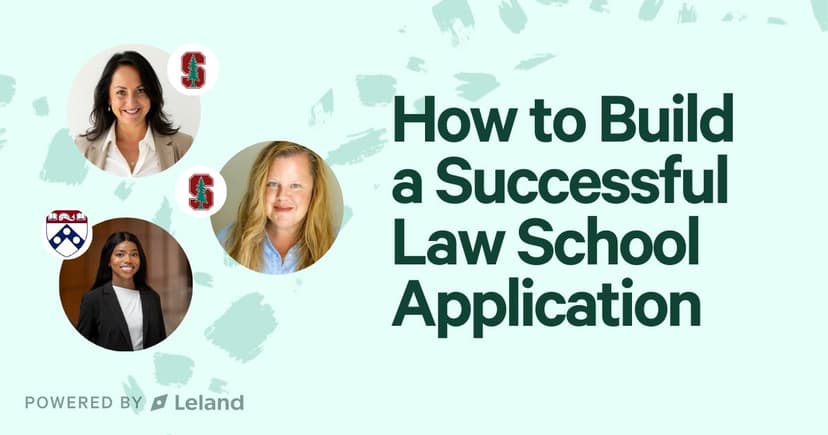Georgetown Law Personal Statement Guide: Examples & Admit Tips
Want to make your Georgetown Law personal statement shine? Get expert tips, real examples, and practical advice to help you stand out in the admissions process.
Posted August 29, 2025

Join a free event
Learn from top coaches and industry experts in live, interactive sessions you can join for free.
Table of Contents
Writing a Georgetown Law personal statement is a critical part of your law school application. This statement gives you a chance to showcase who you are, what you have accomplished, and why this school is the right fit for your future. It is your opportunity to stand out from the crowd and leave a lasting impression on the admissions committee. Here's a guide on how to approach your personal statement and get one step closer to your goal of attending Georgetown Law School.
Read: How to Get Into Georgetown Law School
What is Georgetown Law School
Georgetown University Law Center, commonly known as Georgetown Law, is a prestigious law school located in Washington, D.C. It is part of Georgetown University and offers various legal programs, including the Juris Doctor (J.D.) and Master of Laws (LL.M.). The school is renowned for its strong connections to the U.S. government and offers students unique opportunities for internships and networking in the nation's capital.
The campus is situated near the U.S. Capitol, providing students with unique opportunities for internships and networking in the heart of the nation's legal and political landscape.
Understanding the Role of Law School Personal Statement in Admissions
Why Your Personal Statement Matters
Your personal statement plays a significant role in the admissions process. It is one of the first things the admissions committee reviews, giving them insight into who you are beyond your LSAT scores and resume. Your personal statement will provide the opportunity to show that you have the critical thinking skills and motivation needed to succeed.
Unlike your resume or law school personal essay, the personal statement focuses more on your background, challenges you’ve overcome, and what drives you to pursue law. It is an important piece of your documents because it gives a human touch to your application and highlights what makes you a unique applicant.
How Your Personal Statement Connects with Other Application Materials
Your personal statement should not repeat information from other parts of your application. Instead, it should complement your resume, LSAT scores, and other optional essays. For instance, if you’ve had unique life experiences such as overcoming significant challenges or gaining experience in a specific field, your personal statement is the place to explain how these moments influenced your decision to pursue law.
The conduct statement and diversity statement are also important elements that add depth to your application. If you choose to submit an optional response or optional essays, these can help provide more context, but your personal statement remains the central piece.
Read: How to Get Into Law School: Advice from an Expert
Essential Components of a Strong Georgetown Law Personal Statement
1. What to Include in Your Personal Statement
The admissions committee wants to know why you are passionate about law and why you’re interested. Your personal statement should cover the following:
Your background
Describe your life story. Whether you’ve overcome significant challenges or had unique experiences, make sure to explain how these moments shaped your decision to pursue law.
For Example: Growing up in a small town, I saw firsthand how my father, a single parent, and has a small business struggled with legal issues due to his lack of understanding of laws. His inability to fully understand contracts and rules ended up costing him. This experience motivated me to pursue law. I promised myself to help others avoid similar challenges. And while I was volunteering at a local legal aid clinic, I also helped an elderly woman fight an unfair eviction, which further solidified my decision. These experiences shaped my passion for law and deepened my desire to advocate for those who need it most.
Critical thinking skills
Use examples that show your thinking skills and how you’ve applied them in real-world situations. Law is about problem-solving, and the committee wants to see that you can think critically and logically.
For Example: During my internship at a non-profit, I was tasked with helping a family facing eviction. After reviewing their case, I identified a gap in the landlord’s compliance with local housing laws. I presented this information to our legal team, and because of that were able to delay the eviction and secure alternative housing for the family. This experience taught me how critical thinking and attention to detail are essential in solving legal problems.
Your interest in the school
Explain why this school is the right fit for you. What specific programs or opportunities at Georgetown draw you in? Make sure to demonstrate your enthusiasm and how Georgetown can help you achieve the next chapter of your law career.
For Example: Georgetown Law is focused on public service and its Civil Rights Clinic. This really aligns with my goals. I am passionate about advocating for underserved communities, and Georgetown’s emphasis on social justice and human rights speaks to that. The chance to work with experienced faculty and big minds in the industry will also give me the tools I need to become a public defender. The combination of strong academics and commitment here on making a difference is exactly what I need to take the next step in my legal career.
Read: The Role of Internships in Law School Applications
2. Crafting Your Story: Making a Lasting Impression
Your personal statement needs to be memorable, but it also needs to be authentic. Tell your story in a way that highlights your strengths and makes you stand out. The admissions committee is looking for applicants who are genuine, so avoid the temptation to use big words or try to sound overly formal. Be clear, be yourself, and be concise. Make sure to explain what motivates you, what challenges you’ve overcome, and how those experiences will make you an asset.
Note: Avoid sounding like you’re bragging or giving in to big egos. The goal is to show humility as you reflect on your journey.
3. Common Mistakes to Avoid
Many students fail to make their personal statement stand out because they:
Repeat their resume- Your personal statement should not be a second version of your resume. Use this space to explain experiences or challenges that aren’t covered elsewhere.
The use of legal jargon- Keep your language clear and simple. The admissions committee isn’t looking for complex vocabulary. They want to understand your story.
Be too general- Avoid writing a statement that could apply to any law school. Tailor your personal statement specifically to Georgetown Law by referencing what makes the school unique and why it is a good fit for you.
Structuring Your Personal Statement
The Ideal Structure for your Statement
While the content of your personal statement is important, how it is structured also matters. Follow a simple yet effective format:
Introduction- Your opening should be engaging and set the tone for the rest of your statement. Briefly introduce yourself and mention what inspired you to pursue law.
Body- This is where you will highlight key experiences, discuss how they shaped your desire to attend Georgetown Law, and showcase your thinking skills. Explain your journey, challenges you’ve faced, and why Georgetown Law is your school of choice.
Conclusion- Wrap up by reinforcing your goals and how Georgetown Law will help you achieve them. You should leave the admissions committee with a strong impression of who you are and your potential.
Read: Crafting a Winning Diversity Statement for Law School: Essential Tips
How to Format: Double Spaced vs. Single Spaced
While Georgetown doesn’t specify a preference for double-spaced or single spaced, most law schools prefer double-spaced submissions for readability. Be sure to follow any instructions given by Georgetown Law, as some schools may provide specific formatting requirements for the personal statement.
Optional Essays and the Unlisted Video
Do You Need to Submit an Optional Essay?
Georgetown Law allows you to submit optional essays, but you should only do so if you feel they will strengthen your application. If there is something you need to explain, such as a gap in your resume, a conduct statement, or any extenuating circumstances, an optional essay can help provide clarity. Make sure your optional response is tailored and directly relevant to your application.
The Power of the One-Minute Video
A one-minute video is another optional element that some applicants submit to supplement their application. This video provides you with the opportunity to introduce yourself to the admissions committee in a more personal way. You can use this space to emphasize why this school is the right fit for you and to further explain parts of your application materials that might need more context.
Note: Keep your video professional. Make sure it is clear and concise, without any unnecessary elaboration. The video unlisted on YouTube can be a convenient and easily accessible option. You can simply provide the URL link in your application.
What Makes Georgetown Law Different? Aligning Your Statement with Their Values
How Georgetown Law’s Unique Programs Align with Your Goals
When writing your personal statement, make sure to reference what makes Georgetown Law School special. Discuss how their specific programs, resources, and focus areas align with your academic and career goals. Mention its commitment to diversity, its accessible website, and its unique approach to law education resonate with your background and aspirations.
Using Georgetown’s Easily Accessible Website for Valuable Information
Before writing your statement, visit Georgetown’s official website and watch videos or look at other resources about their law programs. By referencing their website, you’ll be able to showcase your knowledge of the law school’s strengths and programs. This information is already easily accessible on their website, and it is a good idea to mention specific programs that match your goals.
5 Expert Tips for Submitting Your Personal Statement
1. Begin with a Personal Story that Reflects Your Unique Journey
Instead of starting with a generic line in law, share a personal experience that shaped your decision to pursue it. Georgetown Law is looking for applicants who bring their own story and perspective, so use your introduction to make an impact and give them a glimpse into who you are beyond your resume.
Expert Tip: Keep it authentic. Avoid clichés or trying to impress the reader with an overly dramatic story. Show your true self.
2. Use Real Examples to Demonstrate Your Critical Thinking Skills
Rather than listing your achievements, focus on showing how you think. Talk about situations where you identified a problem, analyzed it, and found a solution. Georgetown wants to see that you can approach challenges logically and critically.
Expert Tip: Think of a specific moment from your work, volunteer experiences, or academics where you used critical thinking to solve a real problem. Make the story engaging and show your thought process.
3. Tie Your Goals Directly to Georgetown’s Programs
It is not enough to just say you're interested in Georgetown Law. Show them exactly why. Demonstrating that you’ve taken the time to learn about the school shows you’re serious about attending and helps your statement stand out.
Expert Tip: Research Georgetown's faculty, programs, and clinics that align with your ideals, and mention them specifically in your statement.
4. Show Your Commitment to Diversity with Action
Instead of just stating you value diversity, share how you’ve engaged with it. Georgetown values diversity, so explain how your unique experiences will add to the law school community.
Expert Tip: Give concrete examples of how you’ve worked with or learned from diverse groups. Show how your perspective will contribute to the broader conversation at Georgetown.
5. End Strong: Show Why Georgetown is the Right Fit for You
Your conclusion is your chance to tie everything together. Instead of ending with a generic line like “I want to make a difference,” explain how the school is the perfect place for you to achieve your goals. Be specific about what you plan to do with the tools you’ll gain at Georgetown and how you hope to impact the legal field.
Expert Tip: Keep the focus on the school's unique resources and how they align with your career vision. Make sure your conclusion leaves the committee with a sense of your future potential.
Note: It is also a good idea to have someone else review your personal statement. Whether it's your mentor, advisor, or friend, feedback can help catch errors you might have missed and provide valuable insights into how your statement comes across.
The Bottom Line
Your Georgetown Law personal statement is your moment to shine. It is your opportunity to tell the admissions committee who you are, what you've achieved, and why you’re ready to take the next step in your law journey. Keep it simple and on point. Share your background, tell a personal story that sparks your passion for law, and show how Georgetown’s programs align with your future goals. Highlight how your critical thinking skills have shaped your path, and explain why this school is the perfect fit for you. Prove to them that you’re not just another applicant but someone with a unique story and a strong desire to contribute to their community. End by tying everything together, leaving them with a clear sense of why you belong at Georgetown. Take your time, be authentic, and let them see the real you.
Ready to craft a personal statement that stands out? Work with our Law School Admissions Consultant for personalized guidance, expert tips, and strategies to craft a statement that gets noticed. Start today and let us help you take your application to the next level!
Read these next:
- 25+ Latin Terms Every Law School Student Should Know
- How Many Law Schools You Should Apply To (& How to Choose One)
- The 10 Best Law School Coaches (2025) | Law School Admissions Consulting That Works
- Essential Factors Law Schools Consider During Admissions
- How Old is Too Old for Law School? (And How to Get In)
FAQs
What is the personal statement requirement for Georgetown Law?
- Georgetown Law requires a personal statement as part of your application. It’s your chance to describe why you’re passionate about law and explain how your background has prepared you for this future path. The admissions committee is looking for insight into your personal story, your experiences, and why it is the right place for you to continue your education. Keep it clear, focused, and authentic.
Does Georgetown take a personal statement?
- Yes, Georgetown Law definitely takes a personal statement. It is a part of the application process that allows you to share your motivations. Focus on what sets you apart, and explain why you’re aiming to attend Georgetown. Don’t just repeat what’s on your resume. Use the personal statement to give the committee a sense of who you are beyond the numbers.
What is the lowest LSAT score to get into Georgetown?
- While Georgetown doesn’t have a strict cut-off for LSAT scores, most admitted students tend to fall within the range of 164 to 173. If your score is on the lower end of that range, don’t worry too much. It’s about the bigger picture. Strong application documents, like a compelling personal statement, can help prepare you for a better chance of being accepted.
Can I get into Georgetown Law with a 3.5 GPA?
- Yes, a 3.5 GPA can still get you into Georgetown Law, but it’s important to keep in mind that the school considers the entire application. They’ll look at your thinking skills, your personal statement, and how you’ve applied your background to the future of law. If your GPA is on the lower side, make sure that the other parts of your application are really strong like a solid LSAT score and a personal statement that truly describes your passion for law.























